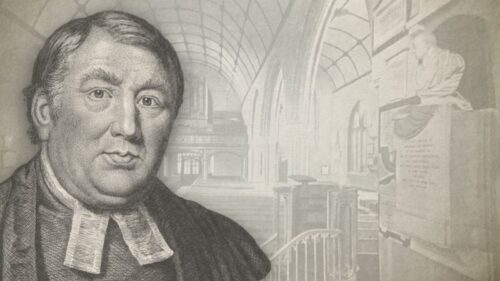
November 17—Morning Devotion
“And he was clothed with a vesture dipped in blood.”—Revelation 19:13
Oh thou bleeding Lamb of God! didst thou thus appear to thy servant John, to tell him, and the church through him, that thy priesthood and thy sacrifice are of the same everlasting nature and efficacy as thy person and thy finished work—”the same yesterday, and to-day, and for ever?” And didst thou thus manifest thyself by way of assuring thy poor needy followers that thou delightest in thine office, and lovest to be employed? Was it not, dearest Jesus, to this end, and as much in effect, as if thou hadst said, see, I wear these priestly garments: behold my vesture still fresh with the blood which I offered in the day of my sacrifice on the cross, for my redeemed, and for whom I still appear in the bloody robe, as a proof of the everlasting efficacy. For whom, but for my people, do I wear this vesture? “My soul, art thou looking now, with an eye of faith, within the veil? Hast thou a blessing to ask at the court of heaven, this day? Fly then to Jesus. Behold him still, as John beheld him, and hear what he saith. Remember, his blood speaks; for so the Holy Ghost declares”—it speaks better things than that of Abel;” for Abel’s blood cried for vengeance. Jesus pleads for mercy. And doth it not speak to God for pardon, and from God in covenant promises of pardon? Oh the blessedness to behold Jesus clothed with a vesture dipped in blood, in confirmation that “we have redemption through his blood, the forgiveness of sins, according to the riches of his grace.”
Robert Hawker (1753-1827) was an Anglican (High-Calvinist) preacher who served as Vicar of Charles Church, Plymouth. John Hazelton wrote of him:
“The prominent features…in Robert Hawker's testimony…was the Person of Christ….Dr. Hawker delighted to speak of his Lord as "My most glorious Christ.” What anxious heart but finds at times in the perusal of the doctor's writings a measure of relief, a softening, and a mellowing? an almost imperceptible yet secret and constraining power in leading out of self and off from the misery and bondage of the flesh into a contemplation of the Person and preciousness of Christ as "the chiefest among ten thousand and the altogether lovely." Christ and Him crucified was emphatically the burden of his song and the keynote of his ministry. He preached his last sermon in Charles Church on March 18th, 1827, and on April 6th he died, after being six years curate and forty-three years vicar of the parish. On the last day of his life he repeated a part of Ephesians 1, from the 6th to the 12th verses, and as he proceeded he enlarged on the verses, but dwelt more fully on these words: "To the praise of His glory Who first trusted in Christ." He paused and asked, "Who first trusted in Christ?" And then made this answer: "It was God the Father Who first trusted in Christ."
Robert Hawker on the Biblical Covenants (Complete)
Robert Hawker's Poor Man's Morning Portions





